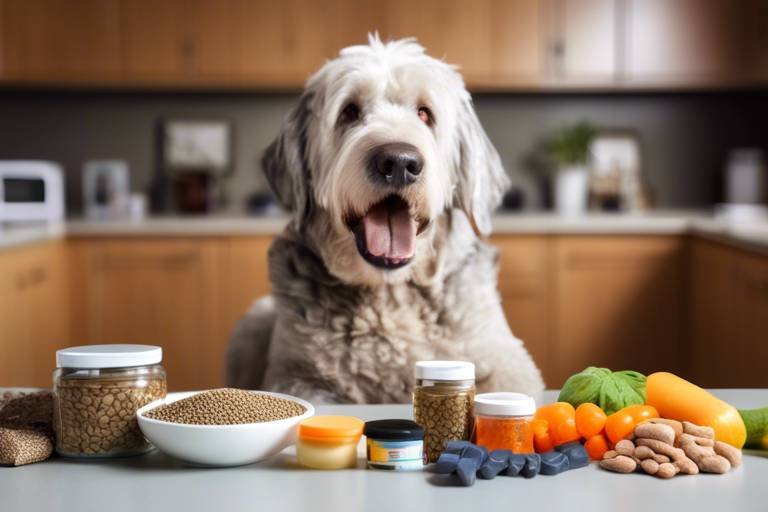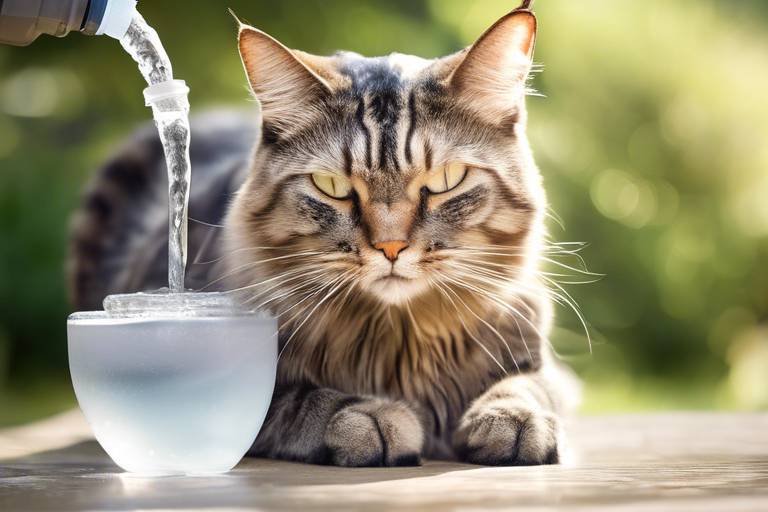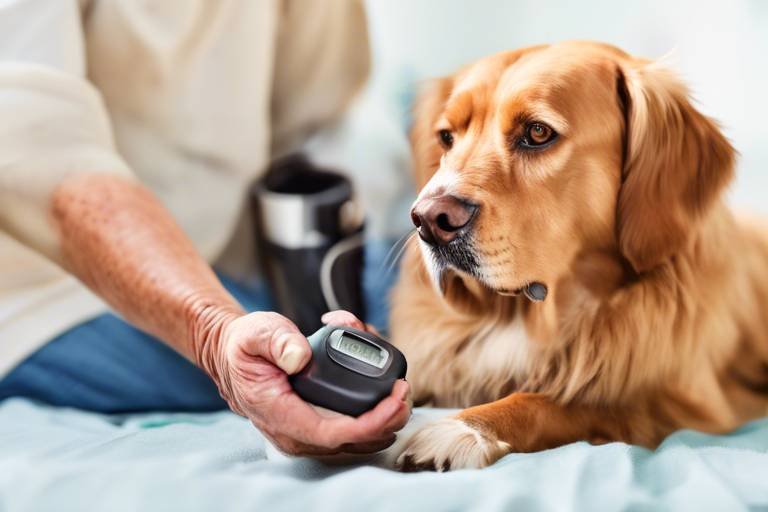How to Introduce Supplements to Your Senior Pet's Diet
As our furry friends age, their bodies undergo various changes that can affect their overall health and well-being. Just like us, senior pets can benefit from a little extra support in their diets. Incorporating dietary supplements can be a game-changer, ensuring they remain vibrant and active in their golden years. But how do you go about introducing these supplements without causing digestive issues or overwhelming your pet? In this article, we’ll explore effective strategies to seamlessly integrate supplements into your senior pet's diet while keeping their health at the forefront.
As pets age, their nutritional requirements change significantly. Senior pets often require fewer calories but more nutrients to support their health. This means that while they may not need as much food, the quality of what they consume becomes even more critical. It's essential to focus on high-quality proteins, healthy fats, and essential vitamins and minerals. For instance, senior pets may benefit from diets rich in omega-3 fatty acids, which can help reduce inflammation and support heart health. Adapting their diets accordingly ensures that they receive the necessary nutrients to thrive.
Selecting appropriate supplements for senior pets can be overwhelming due to the plethora of options available. When choosing the right supplements, consider the following factors:
- Specific Health Needs: Does your pet have joint issues, skin problems, or digestive concerns?
- Ingredient Quality: Look for reputable brands that use high-quality ingredients.
- Veterinary Recommendations: Always consult your vet for personalized advice.
These factors will help you narrow down the options and find the best supplements to support your pet's health.
Various supplements can enhance your senior pet's diet, providing significant health benefits. Some of the most common types include:
- Joint Support: Supplements like glucosamine and chondroitin are vital for maintaining joint health.
- Vitamins: Essential vitamins can boost immune function and energy levels.
- Probiotics: These can improve gut health and digestion.
Understanding these types can guide your choices in supplementing your pet's diet effectively.
Joint health is crucial for senior pets, as many experience stiffness and discomfort as they age. Popular joint supplements, such as glucosamine and chondroitin, can significantly improve mobility and reduce discomfort. These supplements work by promoting cartilage health and reducing inflammation in the joints, allowing your pet to move around more freely and comfortably.
Essential vitamins and minerals play a vital role in maintaining overall health. For senior pets, Vitamin E and Vitamin C are particularly important, as they support immune function and help combat oxidative stress. Additionally, B vitamins can boost energy levels, keeping your furry friend lively and engaged.
Before introducing any new supplements, consulting with a veterinarian is essential. Your vet can provide tailored advice based on your pet's specific health needs and conditions. They can also recommend the right dosages and ensure that the supplements won’t interfere with any medications your pet may be taking. This professional guidance is crucial to ensure safety and effectiveness.
Introducing supplements gradually helps pets adjust better. Start by mixing a small amount of the supplement into your pet's regular food. Over a week or two, gradually increase the amount until your pet is accustomed to the full dosage. This slow introduction minimizes the risk of digestive upset and allows you to monitor how your pet reacts to the new addition.
Observing your pet's reaction to new supplements is crucial. Look for signs of improvement, such as increased energy levels or improved mobility. However, also be vigilant for any adverse reactions, such as vomiting or diarrhea. If you notice any concerning symptoms, it’s important to consult your veterinarian immediately.
Every pet is unique, and dosage adjustments may be necessary based on their health and response to the supplements. If your pet seems to be thriving, great! But if you notice any negative effects, don’t hesitate to adjust the dosage or try a different supplement. The key is to find what works best for your senior pet.
Q: How do I know if my pet needs supplements?
A: If your pet shows signs of aging, such as decreased energy, joint stiffness, or changes in coat quality, they may benefit from supplements. Always consult your vet for advice.
Q: Can I give my pet human supplements?
A: It's not recommended to give human supplements to pets without veterinary guidance, as some ingredients can be harmful to animals.
Q: How long does it take to see results from supplements?
A: Results can vary, but many pet owners notice improvements within a few weeks of consistent use.

Understanding Senior Pet Nutritional Needs
As our beloved pets age, their bodies undergo significant changes that affect their nutritional requirements. Just like humans, senior pets experience a decline in metabolism and may face health challenges that necessitate a shift in their diet. This is a crucial time to reassess what goes into their bowls. It's not just about keeping them full; it’s about giving them the right fuel to maintain their health and vitality. So, what exactly do senior pets need?
First and foremost, senior pets often require a higher quality protein in their diet. As they age, their muscles can begin to deteriorate, and a protein-rich diet helps preserve muscle mass. But beware! Not all proteins are created equal. Look for high-quality sources like chicken, fish, or lamb, which are easier for older pets to digest.
Another important aspect is fiber. Older pets can experience digestive issues like constipation or diarrhea. A diet rich in fiber helps keep their digestive system running smoothly. You might want to consider adding some pumpkin or sweet potatoes to their meals, as these are excellent sources of fiber.
Additionally, senior pets often have specific requirements for fatty acids. Omega-3 and Omega-6 fatty acids can do wonders for their skin and coat health, and they also support joint health, which is critical as they age. Look for supplements or pet foods that contain fish oil or flaxseed oil.
Lastly, hydration is key! Older pets can be prone to dehydration, so ensure that fresh water is always available. You can also incorporate wet food into their diet to help boost their water intake.
To summarize, here are some pivotal nutritional needs for senior pets:
- High-quality protein to maintain muscle mass.
- Fiber for digestive health.
- Fatty acids for skin, coat, and joint health.
- Hydration to prevent dehydration.
Understanding these nutritional needs is just the first step. It’s essential to tailor your senior pet's diet to meet these requirements, ensuring they live a healthy, happy life in their golden years. Remember, a well-balanced diet is the foundation of good health for your furry friend!

Choosing the Right Supplements
When it comes to selecting the right supplements for your senior pet, the process can feel a bit like navigating a maze. With so many options available, how do you know which ones will truly benefit your furry friend? The key is to focus on a few essential factors that can guide your decision-making. First and foremost, consider your pet's specific health needs. Just like humans, pets have unique requirements based on their age, breed, and any existing health conditions. For instance, a senior dog suffering from arthritis will have different supplement needs compared to a cat with a sensitive stomach.
Another important aspect to think about is the quality of the supplements. Not all products are created equal, and choosing high-quality brands can make a significant difference in your pet's health. Look for supplements that have undergone rigorous testing and have been approved by veterinary professionals. This ensures that what you're giving your pet is both safe and effective. Additionally, pay attention to the ingredient list; avoid products with artificial additives or fillers, as these can cause more harm than good.
Furthermore, it’s essential to consider the delivery method of the supplements. Some pets are picky eaters and may refuse pills or powders, while others may readily accept them mixed into their food. Here are some common forms of supplements:
- Pills or Capsules: These can be effective but may require some coaxing to get your pet to take them.
- Soft Chews: Many pets find these more palatable, and they often come in flavors that appeal to pets.
- Liquid Supplements: These can be mixed with food or given directly, making them a versatile option.
Lastly, it’s wise to read reviews and seek recommendations from other pet owners or your veterinarian. Personal experiences can provide valuable insights into which supplements have worked well for others. This step can save you time and money by steering you clear of ineffective products.
In summary, choosing the right supplements for your senior pet involves understanding their specific health needs, prioritizing quality, considering delivery methods, and seeking trusted recommendations. By taking the time to make informed choices, you can help ensure that your beloved companion enjoys a healthier, happier life in their golden years.
Types of Beneficial Supplements
When it comes to enhancing your senior pet's diet, understanding the available is crucial. As our furry companions age, they may experience various health challenges that can be alleviated with the right nutritional support. These supplements can provide a significant boost to their overall well-being and quality of life. To help you navigate this landscape, let's explore some common types of supplements that can make a real difference.
First and foremost, joint health supplements are essential for senior pets. As they grow older, many pets experience stiffness and discomfort in their joints. This can lead to decreased mobility and an overall decline in their quality of life. Supplements containing glucosamine and chondroitin are popular choices for promoting joint health. These ingredients work together to support cartilage and joint function, allowing your pet to move more freely and comfortably.
In addition to joint health, vitamins and minerals play a vital role in maintaining your senior pet's overall health. As pets age, their bodies may require additional nutrients to support their immune system and energy levels. Key vitamins such as Vitamin E, which acts as an antioxidant, and Vitamin B12, essential for energy production, can be particularly beneficial. A well-rounded supplement that includes essential minerals like calcium and omega-3 fatty acids can further enhance your pet's well-being.
Moreover, probiotics are another type of supplement that can be incredibly beneficial for senior pets. As pets age, their digestive systems may become less efficient, leading to issues such as constipation or diarrhea. Probiotics help to maintain a healthy gut flora, promoting better digestion and nutrient absorption. This can be especially important for senior pets who may have sensitive stomachs or have recently experienced dietary changes.
To summarize, here are some of the key types of beneficial supplements for senior pets:
- Joint Health Supplements: Glucosamine and chondroitin for mobility.
- Vitamins and Minerals: Essential nutrients for immune function and energy.
- Probiotics: Supports digestive health and gut flora balance.
By incorporating these types of supplements into your senior pet's diet, you can help ensure they enjoy their golden years with vitality and comfort. However, it's essential to remember that not all supplements are created equal. Always opt for high-quality products and consult with your veterinarian to determine the best options tailored to your pet's specific needs.
Q: How do I know if my pet needs supplements?
A: Signs that your pet may benefit from supplements include decreased energy, joint stiffness, digestive issues, or changes in appetite. Consulting with your veterinarian is the best way to assess your pet's needs.
Q: Can I give my pet human supplements?
A: No, human supplements can be harmful to pets. Always use supplements specifically formulated for pets, as their nutritional needs differ significantly from ours.
Q: How long does it take to see results from supplements?
A: This can vary depending on the type of supplement and your pet's health condition. Some pets may show improvement within a few weeks, while others may take longer. Consistency is key!
Joint Health Supplements
When it comes to our beloved senior pets, joint health is a topic that simply cannot be overlooked. As pets age, their joints often become less flexible, and they may experience discomfort or pain, making everyday activities like jumping, running, or even walking a challenge. This is where come into play, acting as a lifeline to help maintain mobility and improve their quality of life.
One of the most popular ingredients found in joint supplements is glucosamine. This naturally occurring compound helps to build cartilage, which is essential for joint function. Think of glucosamine as a cushion for your pet’s joints, absorbing shock and reducing wear and tear. Another key player is chondroitin sulfate, which works alongside glucosamine to enhance its benefits. Together, they form a powerful duo that can help alleviate pain and improve mobility.
Additionally, omega-3 fatty acids are gaining traction in the realm of joint health. These fatty acids are known for their anti-inflammatory properties, which can significantly reduce joint swelling and discomfort. They act like a soothing balm, easing the inflammation that often plagues senior pets. When selecting a supplement, look for those that combine glucosamine, chondroitin, and omega-3s for a comprehensive approach to joint care.
It’s important to remember that not all joint supplements are created equal. When choosing a product, consider the following:
- Quality of Ingredients: Always opt for high-quality supplements from reputable brands. Check for third-party testing to ensure purity and potency.
- Formulation: Some supplements come in chewable treats, while others are powders or liquids. Choose the form that your pet will readily accept.
- Dosage: Follow the recommended dosage on the label, and consult with your veterinarian for tailored advice based on your pet’s specific needs.
Incorporating joint health supplements into your senior pet's diet can be a game-changer. Not only can they help alleviate discomfort, but they can also promote a more active lifestyle, allowing your furry friend to enjoy their golden years to the fullest. Remember, though, that patience is key; it may take a few weeks to notice significant improvements. Regular check-ins with your veterinarian can also provide valuable insights into your pet's progress.
Vitamins and Minerals
As our furry companions age, their bodies undergo various changes that can impact their overall health. One of the most crucial aspects of maintaining a senior pet's well-being is ensuring they receive the right balance of vitamins and minerals. These essential nutrients are like the fuel that keeps your pet’s engine running smoothly, helping them stay active, energetic, and healthy. Just like humans, senior pets require specific vitamins and minerals to support their immune system, energy levels, and overall vitality.
For instance, Vitamin E and Vitamin C are powerful antioxidants that can help combat oxidative stress, which tends to increase as pets age. This oxidative stress can lead to various health issues, so incorporating these vitamins can be a game-changer. Additionally, B vitamins play a pivotal role in energy metabolism, ensuring that your senior pet has the stamina to enjoy their daily activities, whether it's a gentle walk in the park or a playful romp in the backyard.
Moreover, minerals such as calcium and phosphorus are vital for maintaining strong bones and teeth, which can become more fragile with age. A lack of these minerals can lead to conditions like osteoporosis, making it essential to monitor their intake. It's also worth noting that Omega-3 fatty acids, while technically not a vitamin or mineral, are crucial for senior pets as they can help reduce inflammation and support joint health.
When considering the addition of vitamins and minerals to your senior pet's diet, it's important to remember that not all supplements are created equal. Some may contain fillers or artificial ingredients that can do more harm than good. Therefore, always opt for high-quality products from reputable brands. Additionally, a balanced diet rich in whole foods can often provide many of the necessary nutrients your pet needs. However, if you suspect your pet may be lacking in certain areas, consulting with your veterinarian can help you determine the best course of action.
Here’s a quick overview of key vitamins and minerals beneficial for senior pets:
| Nutrient | Benefits |
|---|---|
| Vitamin E | Antioxidant support, helps combat oxidative stress |
| Vitamin C | Supports immune function and overall health |
| B Vitamins | Energy metabolism, supports brain health |
| Calcium | Essential for strong bones and teeth |
| Omega-3 Fatty Acids | Reduces inflammation, supports joint health |
In conclusion, ensuring that your senior pet receives adequate vitamins and minerals is vital for maintaining their health and quality of life. By being mindful of their dietary needs and consulting with your veterinarian, you can help your beloved companion thrive well into their golden years.
- What are the signs that my senior pet may need more vitamins and minerals? Look for changes in energy levels, coat condition, and overall health. If you notice any significant changes, it’s best to consult your veterinarian.
- Can I give my pet human vitamins? It’s generally not recommended to give pets human vitamins without veterinary guidance, as some human supplements can be toxic to animals.
- How do I know which supplements are right for my pet? Consulting with your veterinarian is the best way to determine the appropriate supplements based on your pet’s specific health needs.
Consulting with Your Veterinarian
When it comes to the health and well-being of your senior pet, is not just a good idea; it's absolutely essential. Think of your vet as your pet's personal health coach, equipped with the knowledge and tools to help you make informed decisions. Before diving into the world of dietary supplements, it's crucial to have a conversation about your pet's specific needs. After all, every pet is unique, and what works for one might not work for another.
Your veterinarian can provide valuable insights into your pet's current health status, any underlying conditions, and their dietary requirements. They can help you understand which supplements might be beneficial and which ones to avoid. For instance, if your senior dog has kidney issues, certain supplements could exacerbate the problem rather than help it. This is where your vet's expertise shines, guiding you through the maze of options available in the market.
Moreover, it's important to discuss any existing medications your pet might be taking. Some supplements can interact negatively with medications, leading to unwanted side effects. Your vet can help you navigate these potential pitfalls, ensuring that the supplements you choose will complement your pet's health regimen rather than complicate it.
During your consultation, don’t hesitate to ask questions. Here are some key points you might want to cover:
- What specific supplements do you recommend for my senior pet?
- Are there any risks or side effects associated with these supplements?
- How long should I give the supplements before expecting to see results?
- What dosage is appropriate for my pet’s size and health condition?
In addition, your vet can help you create a comprehensive health plan that includes not just supplements, but also dietary changes, exercise routines, and regular health check-ups. This holistic approach ensures that your senior pet receives the best possible care, enhancing their quality of life.
In summary, consulting with your veterinarian is an indispensable step in introducing supplements into your senior pet's diet. Their expertise will help you make informed decisions, tailor supplementation to your pet’s unique needs, and ultimately, support their health and happiness as they age gracefully.
- How do I know if my pet needs supplements? - Look for signs of aging, such as reduced energy, joint stiffness, or changes in appetite, and consult your vet.
- Are all supplements safe for senior pets? - Not all supplements are suitable for every pet. Always consult your veterinarian before introducing new products.
- How long does it take to see results from supplements? - It can vary by supplement and pet, but typically you may start to see improvements within a few weeks.
- Can I give my pet human supplements? - No, human supplements can contain ingredients that are harmful to pets. Always use pet-specific supplements.

Gradual Introduction of Supplements
Introducing dietary supplements to your senior pet's diet is not just a matter of tossing in a new pill or powder; it requires a thoughtful approach to ensure your furry friend adapts smoothly. Think of it like introducing a new dish to a picky eater—if you throw a whole plate of unfamiliar food at them, they might turn their nose up and refuse to eat altogether! Instead, a gradual introduction allows your pet to become accustomed to the new flavors and textures without overwhelming their digestive system.
Start by incorporating the supplement into your pet's regular meals. A good rule of thumb is to begin with a small dosage—perhaps half the recommended amount—mixed in with their usual food. This way, your pet can slowly acclimate to the new addition. Over the course of a week, you can gradually increase the dosage to the full recommended amount. This slow transition can help minimize any potential digestive upset, which is particularly important for senior pets whose systems may be more sensitive.
During this process, it's essential to keep an eye on how your pet is responding. Are they eating their food with enthusiasm, or are they showing signs of discomfort? If you notice any adverse reactions, such as vomiting or changes in bowel movements, it might be wise to slow down the introduction or consult your veterinarian. Remember, every pet is unique, and what works for one might not work for another.
To help you keep track of the introduction process, you might find it useful to maintain a simple chart. Here's an example of how you can structure it:
| Day | Supplement Dosage | Pet's Reaction |
|---|---|---|
| 1 | 1/2 of recommended dose | Normal |
| 3 | 1/2 of recommended dose | Normal |
| 7 | Full recommended dose | Normal |
By keeping a record, you can easily spot any trends or changes in your pet's behavior, which can be crucial for making informed decisions about their health. And don’t forget to reward your pet with some extra love and praise during this transition! Positive reinforcement can make the process much smoother and more enjoyable for both of you.
In conclusion, a gradual introduction of supplements is key to ensuring your senior pet’s dietary changes are beneficial and stress-free. So take your time, be observant, and consult with your veterinarian when in doubt. Your pet’s health and happiness are worth the extra effort!
- How long should I take to introduce a new supplement? Aim for a week to gradually increase the dosage, but always adjust based on your pet's response.
- What signs should I watch for during the introduction? Look out for changes in appetite, energy levels, or any signs of digestive upset.
- Can I mix supplements with wet food? Yes, mixing with wet food can help mask the taste and make it more palatable for your pet.
- Is it safe to give multiple supplements at once? It's best to introduce one supplement at a time unless directed otherwise by your veterinarian.
Monitoring Your Pet's Response
As a loving pet owner, it's only natural to want the best for your furry friend, especially as they age. When introducing supplements into your senior pet's diet, monitoring their response is crucial. Just like humans, pets can react differently to new additions in their diet, and being vigilant can help you identify any potential issues early on. So, how do you keep an eye on your pet's health as you make these dietary changes?
First and foremost, pay attention to their behavior. Is your pet more energetic or playful than usual? This could be a sign that the supplements are positively impacting their well-being. Conversely, if you notice signs of lethargy, decreased appetite, or unusual behavior, it may indicate that the supplement isn’t agreeing with them. Keep a journal to track these changes; it can be incredibly helpful in identifying patterns over time.
Another important aspect to monitor is their digestive health. Supplements can sometimes lead to digestive upset, especially when introduced too quickly. Watch for signs such as:
- Diarrhea
- Vomiting
- Excessive gas
- Changes in stool consistency
If you notice any of these symptoms, it might be wise to consult your veterinarian. They can provide guidance on whether to continue, adjust the dosage, or try a different supplement altogether.
Additionally, regular veterinary check-ups become even more important as your pet ages. These visits allow for professional evaluations of your pet's health and can help you determine if the supplements are having the desired effect. Your vet may perform blood tests or other diagnostics to assess your pet's overall health status, which can provide valuable insights into how well they are responding to the new supplements.
Lastly, consider your pet's overall quality of life. Are they engaging in their favorite activities? Are they more mobile and comfortable? These subjective measures can often be the best indicators of how well the supplements are working. Remember, the goal is to enhance their quality of life, so any positive changes should be celebrated!
In summary, monitoring your senior pet's response to dietary supplements involves a combination of observation, record-keeping, and professional guidance. By being attentive to their behavior, digestive health, and overall quality of life, you can ensure that the supplements are contributing positively to their health and happiness.
Here are some common questions pet owners have regarding supplements for senior pets:
- How long does it take to see results from supplements? - Results can vary based on the type of supplement and your pet's individual health. Some owners notice changes within a few days, while others may take weeks.
- Can I give my pet multiple supplements at once? - While many pets can handle multiple supplements, it's best to consult your veterinarian to avoid any potential interactions.
- Are there any side effects to be aware of? - Yes, potential side effects can include digestive upset, allergic reactions, or changes in behavior. Always monitor your pet closely after introducing a new supplement.
- What should I do if my pet has a negative reaction? - If your pet shows signs of distress, discontinue the supplement immediately and contact your veterinarian for advice.
Adjusting Dosages as Needed
When it comes to our beloved senior pets, one size does not fit all—especially when it comes to supplements. Every furry friend is unique, and their needs can change over time. This is why adjusting dosages as needed is crucial for ensuring your pet receives the optimal benefits from their supplements without experiencing any adverse effects. Think of it like tuning a musical instrument; just as each instrument has its own distinct sound, each pet has its own unique health profile that requires careful attention.
So, how do you know if your senior pet needs a dosage adjustment? First, keep a close eye on their behavior and health. Are they more energetic? Are they moving around with greater ease? Or perhaps you notice some unexpected side effects, like digestive upset or lethargy. These signs can be indicators that it’s time to reassess the dosage. Here are some key factors to consider:
- Weight Changes: If your pet has gained or lost weight, it may affect how they metabolize supplements. A heavier pet may require a higher dosage, while a lighter one may need less.
- Health Status: If your senior pet has been diagnosed with a new condition or if their existing conditions have changed, discussing dosage adjustments with your veterinarian is essential.
- Age and Activity Level: As pets age, their activity levels may decrease. A less active pet might not need the same dosage as a more energetic one.
It's also important to follow the manufacturer's guidelines on the supplement packaging. Most supplements will provide a recommended dosage based on your pet's weight and age. However, these are just starting points. You might find that your pet responds better to a slightly higher or lower dosage. Always consult your veterinarian before making any changes; they can provide insights tailored to your pet's specific needs.
Additionally, consider keeping a dosage diary to track any changes you make. This can help you and your veterinarian pinpoint what works best for your pet. Documenting their behavior, any side effects, and the dosages administered can provide valuable insights over time. If you notice positive changes, celebrate those wins! If not, it may be time to adjust again.
Ultimately, being proactive about adjusting dosages can significantly enhance your senior pet's quality of life. Remember, the goal is to ensure they are comfortable, healthy, and happy in their golden years. With a little attention and a lot of love, you can help your furry friend thrive!
Q: How do I know if my pet needs a supplement adjustment?
A: Watch for changes in behavior, weight, and overall health. If you notice any concerning signs, consult your veterinarian.
Q: Can I adjust the dosage on my own?
A: While you can make minor adjustments, it’s always best to consult with your veterinarian for guidance tailored to your pet’s specific needs.
Q: How long does it take for supplements to show effects?
A: It varies by supplement and pet, but many see improvements within a few weeks. Keep monitoring your pet’s response.
Q: Are there any risks in giving too much of a supplement?
A: Yes, over-supplementation can lead to adverse effects. Always follow dosage recommendations and consult your vet if in doubt.
Frequently Asked Questions
- What are the signs that my senior pet needs dietary supplements?
As pets age, they may show signs of decreased energy, joint stiffness, or changes in appetite. If you notice your furry friend struggling to jump or keep up during walks, it might be time to consider supplements. Additionally, changes in their coat condition or digestive issues can also indicate that they could benefit from a little extra nutritional support.
- How do I choose the right supplements for my senior pet?
Choosing the right supplements can feel like finding a needle in a haystack, but it doesn't have to be! Start by consulting your veterinarian, who can recommend specific products based on your pet's unique health needs. Look for supplements that target joint health, support immune function, or enhance digestion. Always check for quality ingredients and reputable brands to ensure you're giving your pet the best.
- Can I give my senior pet human supplements?
While it might be tempting to share your vitamins with your furry friend, it's not always safe! Human supplements can contain ingredients that are harmful to pets. Always stick to pet-specific supplements that are formulated for their dietary needs. If you're unsure, a quick chat with your vet can clarify which products are safe and effective for your senior pet.
- How should I introduce new supplements to my senior pet?
Introducing new supplements should be done gradually, like easing into a cool pool on a hot day! Start with a small dose mixed into their regular food, and monitor their response. If they seem to enjoy it and don’t experience any digestive upset, you can slowly increase the dosage. This method helps your pet adjust without overwhelming their system.
- What should I monitor after introducing supplements?
Keep an eye on how your pet reacts after starting a new supplement. Look for any changes in their behavior, energy levels, or digestive health. Signs of discomfort, such as vomiting or diarrhea, may indicate that the supplement isn’t suitable for them. Always be proactive and consult your vet if you notice anything concerning.
- How do I know if the dosage needs to be adjusted?
Every pet is unique, and sometimes their needs change. If you notice your pet isn’t responding as well as expected or if their health status changes, it might be time to reassess the dosage. Consult with your veterinarian to determine if an adjustment is necessary based on your pet’s current health and any changes in their behavior or condition.



















